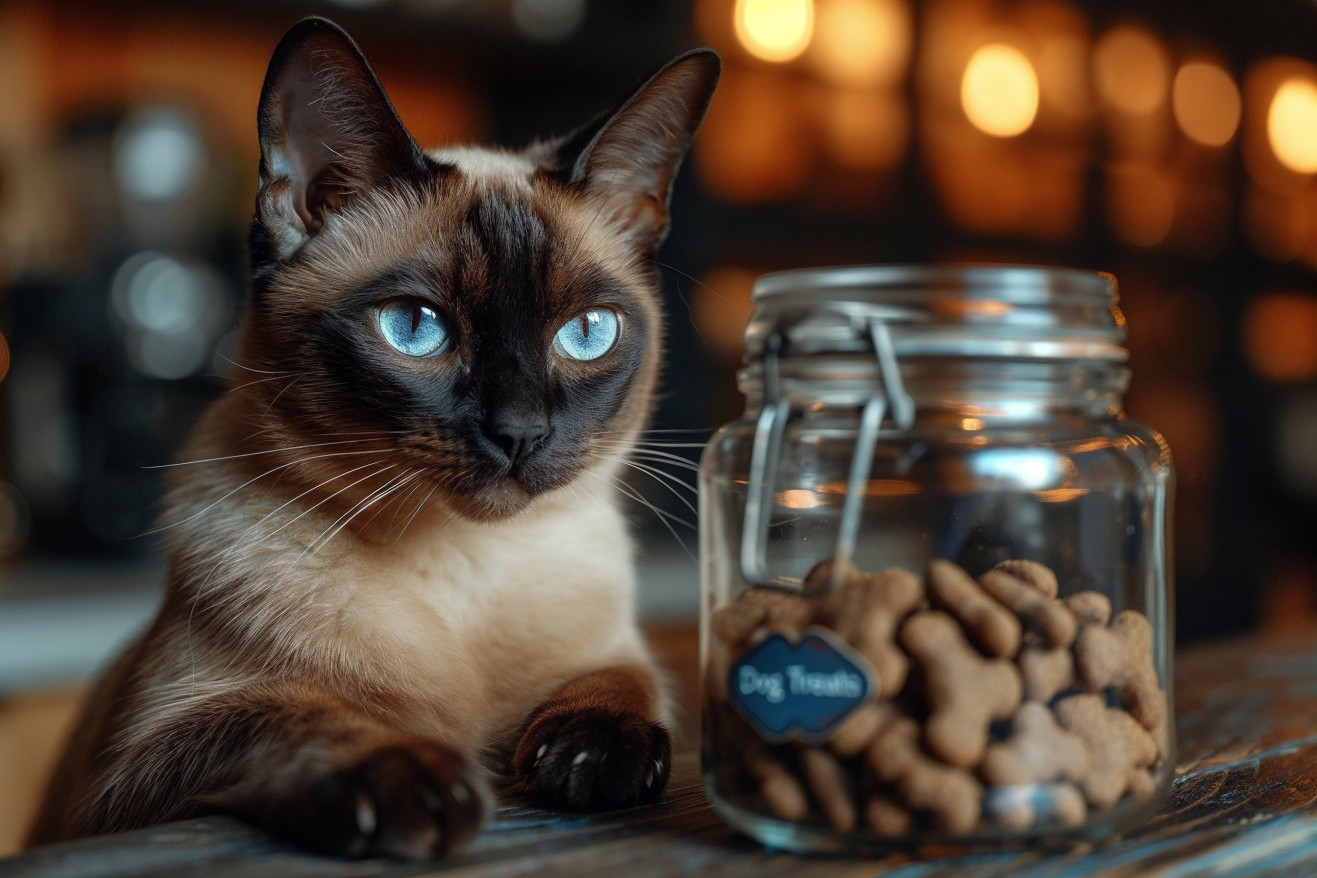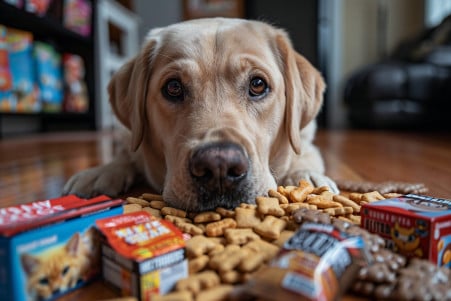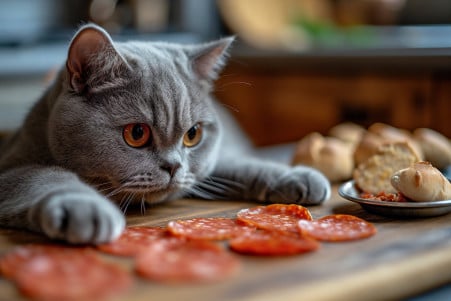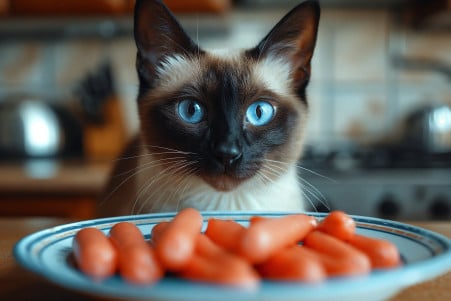Can Cats Eat Dog Treats? Exploring Feline Dietary Needs
7 February 2024 • Updated 6 February 2024

If you have a cat and a dog in the same household, you may have noticed that your cat is interested in your dog’s treats.
But can cats eat dog treats? While it may seem like a harmless indulgence, it’s best to avoid giving your cat dog treats because cats and dogs have different nutritional requirements.
Cats are obligate carnivores, and dog treats are unlikely to contain the nutrients that cats need, such as taurine. While the occasional dog treat is unlikely to cause any harm, it’s best to stick with treats that are specifically formulated for cats.
This article will take a deep dive into the nuances of feline nutrition and the potential dangers of feeding cats dog treats. By drawing on veterinary expertise, nutritional research, and animal health literature, we will explore the differences between cat and dog diets in detail.
With this information, you’ll be able to make the best choices for your cat’s diet and treat options, which will help ensure that your cat lives a long and healthy life.
Can cats eat dog treats?
Why Nutrition Is Important for Your Cat’s Health
Cats have very different nutritional needs than dogs, and there are a number of essential nutrients that they need to stay healthy. Cats are obligate carnivores, which means that they need animal protein to survive, and they require higher levels of protein and certain nutrients that are only found in animal products.
A study from the Cornell University College of Veterinary Medicine explains that cats require a number of nutrients, including vitamins, minerals, fatty acids, and amino acids, and that there are 12 essential nutrients in total.
The Clinical Nutrition Service at Cummings School of Veterinary Medicine at Tufts University notes that a lack of the ability to synthesize certain essential amino acids, like taurine, can lead to serious health problems in cats, including blindness and heart disease.
In addition to their essential nutrient requirements, cats have specific nutritional needs, including the need for arginine for ammonia detoxification and the need for certain vitamins, including pre-formed vitamin A and D3, which cats can’t get from plant-based sources.
As a result, regular dog treats, which aren’t formulated to meet these strict nutritional requirements, aren’t nutritionally adequate for cats and can lead to nutritional imbalances.
Veterinary professionals at Tufts University’s Cummings School of Veterinary Medicine explain that a balanced diet that’s formulated to meet these specific nutritional needs is essential for a cat’s overall health. Therefore, while the occasional dog treat may not seem like a big deal, regular consumption of dog treats can lead to health problems for cats.
Risks of Giving Dog Treats to Cats
The question of whether cats can eat dog treats goes beyond just the desire to satisfy a cat’s curiosity. Cats are obligate carnivores, which means they have specific dietary requirements that dog treats may not meet.
Some of the ingredients commonly found in dog treats, like garlic, onions, and propylene glycol, are toxic to cats. In an interview with PetsRadar, veterinarian Dr. Hannah Godfrey said that these ingredients are safe for dogs and even taste good to cats, but they can be toxic to cats and cause health problems even in small amounts.
Cats can also have allergic reactions and other health problems when they eat dog treats. For example, soft and jerky-style dog treats often contain garlic powder and onion extract, which can lead to anemia in cats if they’re fed to them long-term, according to Einstein Pets.
In addition, the texture of some dog treats, such as dog chews and nylabones, can be a choking hazard and cause dental or digestive problems if cats eat them.
Feeding cats dog treats regularly can also throw off their nutritional balance and lead to nutritional deficiencies.
While Catster notes that some of the ingredients in dog treats, such as blueberries, can be good for cats, they caution against making dog treats a regular part of a cat’s diet.
While an occasional dog treat may not be a big problem, it’s best to avoid making a habit of it to ensure a cat’s health. Instead, cat owners should focus on feeding their pets high-quality cat food and treats that are specifically formulated to meet a cat’s nutritional needs.
Inside the Snack: What’s in Your Dog’s Treat?
From cookies to dental sticks to rawhides to training rewards, the world of dog treats is vast. However, as Petzyo points out, not all dog treats are created equal. Many treats are made with fillers like corn, wheat, or pea protein, which are low in nutritional value.
In addition, nutrient quality can be compromised during the manufacturing process, and even worse, manufacturers can add preservatives that are toxic to cats. For example, BHA/BHT, propylene glycol, and artificial coloring, all of which are found in some dog treats, according to Grubbly Farms, can be unhealthy and even toxic to cats.
The macronutrient profile of dog treats typically includes proteins, carbohydrates, fats, and fiber, and some treats are even fortified with vitamins and minerals that are formulated to meet the nutritional needs of dogs. However, these formulations often don’t include the essential nutrients that cats need, like taurine, arachidonic acid, and high levels of animal-based proteins.
One alternative is to make your own dog treats at home, which allows you to select the ingredients and avoid preservatives and fillers that could be harmful. While homemade treats may be a healthier option for dogs, they still may not meet the unique nutritional needs of cats.
With the potential for the ingredients and processes used in dog treats to be harmful, it’s easy to see why they may not be the best choice for your cat’s treat time.
The Best Treats for Your Cat
With so many options available, it’s important to choose the right treats for your cat. Treats should be a supplement to your cat’s regular diet and should make up no more than 10% of their daily caloric intake, according to VCA Animal Hospitals. Cat treats are often high in protein, which is important for cats’ carnivorous diets, and low in carbohydrates, which is in line with the way cats eat in the wild.
While commercial cat treats are convenient, it’s important to read the labels to make sure you’re getting the right number of calories and the right nutritional balance. VCA recommends looking for treats that have a moderate amount of protein, since many popular treats have too much.
If your cat is overweight or on a special diet, you may want to consider lower calorie treats like water-based vegetables or air-popped popcorn, but make sure to get your vet’s approval first.
If you want to take a more hands-on approach, you can make your own cat treats, which can be a safe and healthy option. VCA Animal Hospitals has a recipe for homemade cat treats that includes cooked chicken and whole wheat flour, which makes for a simple, preservative-free treat that will meet your cat’s protein needs.
Homemade treats, especially those made with canned food, which can be more tailored to your cat’s specific nutritional needs, are also recommended by Dr. Lisa A. Pierson, DVM.
When choosing treats for your cat, it’s important to remember that you’re not just giving them a special snack, you’re also feeding them something that will impact their health and well-being. Make sure to talk to your vet to make sure that the treats you’re giving your cat, whether store-bought or homemade, are part of a healthy diet and are helping to support your cat’s overall health.
Final Thoughts on Cat Treats
After taking a look at the dietary needs of cats, it’s pretty obvious that cats and dogs have very different nutritional requirements. Since cats are obligate carnivores, they need certain nutrients like taurine and animal-based proteins that are not found in dog treats.
Both Catster and PetsRadar stress that while the occasional dog treat may not be a problem for cats, it’s not something that should be encouraged due to the potential for nutritional deficiencies and other health issues.
Part of being a good pet parent is making sure that you’re making informed decisions about what you’re feeding your pets. By creating treats that are specifically for cats, you can make sure that you’re not only giving your cat something that they’ll enjoy but that you’re also giving them something that will help support their health.
From homemade treats to store-bought options, it’s important to make sure that you’re focusing on treats that are made specifically for cats.
Not only is it important to know what your pets need in their diets, but it’s also a way to show them how much you care about them. Always talk to your vet for personalized dietary advice for your cat. Let’s make sure that we’re giving our pets the best chance to be healthy and happy by making sure that we’re giving them the right nutrition for their specific needs.


